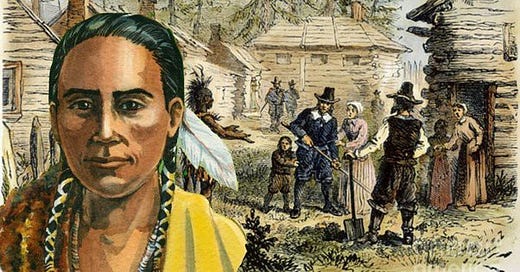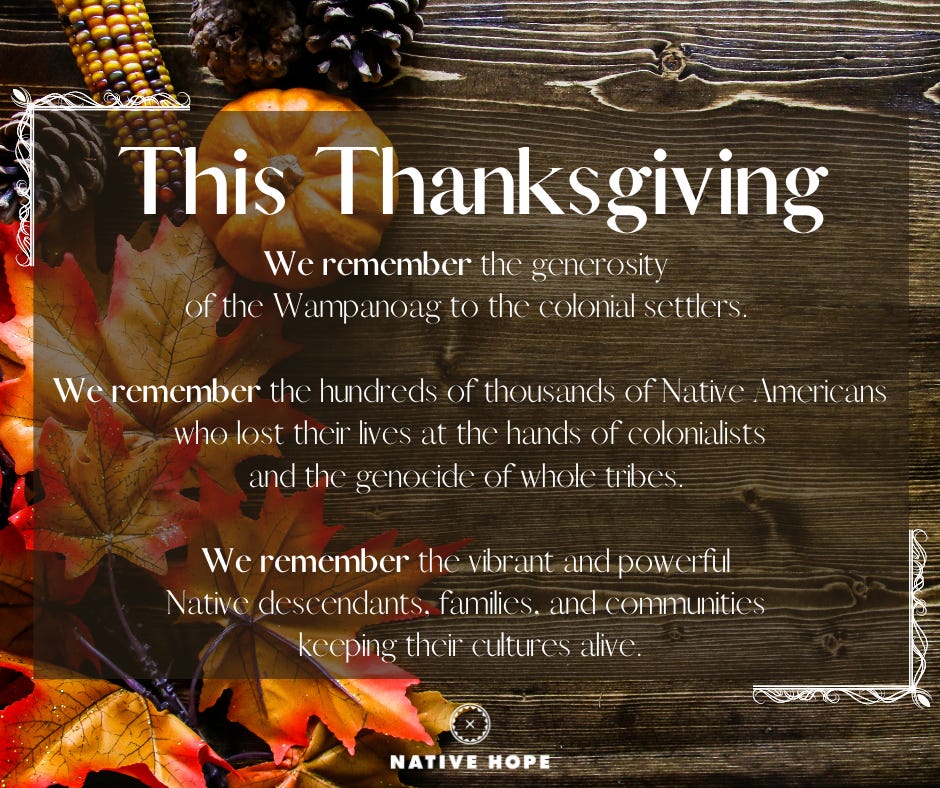This Thanksgiving Let's Remember the Native Americans that made Thanksgiving Possible
Historical Record from the Native American Viewpoint
I received this email this afternoon and it made me think. Think about how and why we celebrate Thanksgiving. And mostly how we have forgotten or a least downplayed the role Native American Indians played in forging this our national day of being grateful.
Grateful? How grateful are we? Today we live in a nation politically divided. The gap between the rich and the poor expands daily. The have and the have-nots are forming tribal units. The rhetoric continues to get ugly and more menacing. Quarrels turning into violence surround us daily. These are difficult and tumultuous times. Yet let me remind you there is light at the end of the tunnel. But to get there we must walk in the darkness a little while longer. It has been said many times it is far better to light a candle than curse the darkness. However, with that illumination, we are likely to see what we don’t want to see; our past transgressions. More specifically our forefather’s transgressions. We can not change the past but we can use the information to right the wrongs and give forgiveness.
This Thanksgiving Day let’s think about the Native Americans who inhabited this land before us and how they learned to survive in a hostile world. And to those that can provide a generous donation as an act of kindness to the less fortunate.
Hi Henry,
Every year, news outlets and social media are a-buzz with Thanksgiving themes.
There is little coverage of the fact that November is Native American Heritage Month or that the day after Thanksgiving, known to most as Black Friday, is Native American Heritage Day.
The dominant cultural and historical story has been told from the perspective of the white colonialists who landed near Plymouth Rock in Massachusetts in 1620. In this version of the Thanksgiving story, the holiday commemorates the peaceful, friendly meeting of English settlers and the Wampanoag tribe for three days of feasting and thanksgiving in 1621.
It’s important to know that for many Native Americans, Thanksgiving is a day of mourning since it commemorates the arrival of settlers in North America and the centuries of genocide and forced assimilation that followed.
It is time to heal these historical wounds and restore trust. It's time to lift up Native voices.
At Native Hope, we're committed to being a resource that helps Native communities meet their needs and a platform to amplify the voices of those unheard. But we can't do this important work without YOU!
Together, we heal generational trauma. Together, we can amplify the voices unheard. Together, we can give Native Americans hope.
Any amount - even $10 - has an impact. We've set a goal of $25,000 to raise for Giving Tuesday. Will you join us?
Jennifer Long, Kul Wicasa Oyate
Executive Director
PS—Learn more about the history of Thanksgiving from the Native American perspective.
====================================================================
I ran across another article that presents an interesting and factual account of a Patuxet native known as Squanto from Dan Spencer on Medium
The Peculiar Truth about Squanto & the Pilgrims
1605: A native man of the Patuxet tribe was kidnapped by British explorers. His name was Tisquantum, but in popular legend, he’s known as Squanto.
His abductors took him to England where he learned the language and studied Christianity.
1614: Another British explorer took Squanto back to the New World as an interpreter.
Shortly after arrival, yet another English captain kidnapped Squanto again.
He was shipped to Malaga, Spain where he was sold as a slave.
But local monks who disapproved of slavery purchased some of the natives and took them to a monastery to live.
Squanto spent four years in Spain among the monks and then escaped to London where he worked for a shipbuilder.
1619: Squanto escaped Europe for good and returned to North America with British explorer Thomas Dermer.
Squanto learned that smallpox, most likely brought by Europeans, had wiped out every member of his tribe. He was the last of the Patuxets.
Squanto joined the Wampanoag tribe and became valuable to Chief Massasoit as an interpreter.
Local tribes had become hostile toward white men, and Squanto persuaded Massasoit to spare Dermer and allow him to depart peacefully.
However, Dermer was later attacked on Martha’s Vineyard and perished.
November 11, 1620, Plymouth, Massachusetts: The Pilgrims arrived from England.
Coincidentally, they encamped on Patuxet land, which was where Squanto’s tribe had all died.
During their first winter in the New World, half of the Pilgrims died from an illness.
By springtime, Squanto taught the Pilgrims how to use dead fish parts for fertilizer, how to hunt for eels barehanded, and how to plant corn. He helped them survive.
Chief Massasoit was at war with the Narragansett tribe. He debated whether or not to drive the Pilgrims off the land or to ask them to join him in fighting his foes.
Squanto persuaded Massasoit to allow the Pilgrims to remain. He understood their ways. With the Pilgrims’ aid, Squanto said, Massasoit could conquer the Narragansett. The Chief agreed.
Tense negotiations began. The white men welcomed Chief Massasoit to their camp but feared they might all die at his hands. Then a peace treaty was made.
Autumn, 1621: Squanto joined the British newcomers in a feast — the first Thanksgiving.
The Pilgrims trusted him. So did Massasoit and the Wampanoags.
Then Squanto broke bad.
Because he was one of very few interpreters, Squanto bragged that one false statement from him could result in war. He used his status to make demands and receive bribes.
To prove his power, Squanto enacted a scheme to persuade the Pilgrims that Massasoit’s men were on their way to attack the colony. It was a lie.
The Colonists learned the truth and asked Massasoit to have Squanto executed for his deceitful actions.
That was a difficult decision, however, because he was still the best interpreter.
In his defense, Squanto denied the conspiracy but agreed to never act in bad faith.
Before his fate could be decided, an unknown ship appeared. More settlers had arrived from England, and the Pilgrims were ordered to feed and shelter them. But the Pilgrims were already near starvation.
Squanto helped negotiate more food for the foreigners. He regained everyone’s trust.
One year after the first Thanksgiving, Squanto became ill and died. The Colonists wrote that he suffered from “Indian fever,” but some people speculate that Massasoit had him poisoned.
Historical opinions of Squanto vary. Some called him childish, others called him sophisticated. He was indispensable yet duplicitous. He was alternately a victim, a villain, and a hero.
The Peculiar Truth about Squanto & the Pilgrims | by Dan Spencer | Nov, 2022 | Medium
I hope this Thanksgiving you give thought to those people who are rarely mentioned or not found in our grade school or high school history books. Our American history is filled with rich and vibrant accounts of ordinary people of many cultures from many nations overcoming enormous odds to survive and many who go on to thrive, yet their stories are lost in time.
My challenge to you is to seek out those stories and bring them back to life so future generations can learn and be inspired. Much of our history is sad and tragic but that should not be the cause to bury them out of sight. The mistakes of our past should not be the blueprint for our future. Our past faults must be acknowledged and remembered for what they are. History shows us the consequences of our egregious errors. We must as civilized people learn from those lessons. Be determined never to allow those tragic and horrible events to happen again.
Let us be thankful we have the knowledge and the courage to be better and show gratitude and mercy to those less fortunate. Let history record how we learned to avoid the mistakes of the past. Let us work to make this our American culture a culture of inclusion, where we can stand shoulder to shoulder together in solidarity as brothers and sisters of the people by the people and for the people.
Thank you and may you truly enjoy a Happy Thanksgiving with your family, friends, and acquaintances!
If you enjoyed reading and would like to make a small contribution without subscribing I have included a Tip Jar thru PayPal for your convenience.
Thank you!






Let me know if you have any recommendations for books about Native American history. My father is very interested and asked for a book for Christmas.
Awesome! Thank you Henry! I will definitely check this out. Thanks for taking the time to respond. I appreciate it!